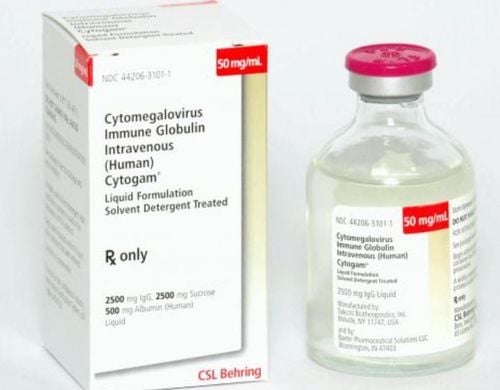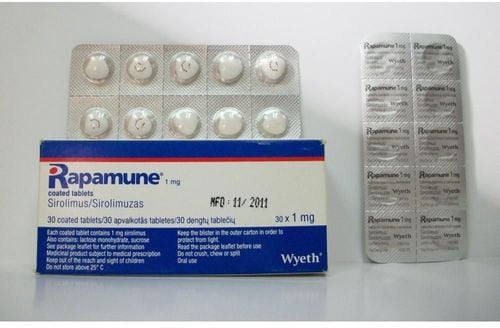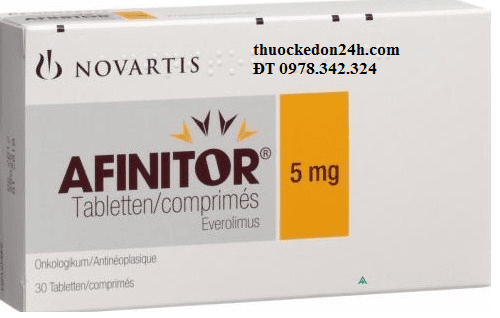This is an automatically translated article.
Certican 0.25mg belongs to the group of anti-cancer drugs and acts on the immune system. The drug is prepared in the form of tablets, packing specifications: Box of 6 blisters x 10 tablets. To ensure safety and maximize the effectiveness of treatment, patients need to take Certican 0.25mg drug exactly as prescribed by the doctor / pharmacist.
1. What are the effects of Certican 0.25mg?
Certican 0.25mg contains the main ingredient Everolimus, which is effective in the prevention of organ rejection in adult patients with low to moderate immunological risk receiving a heart or kidney transplant of the same gene.
Certican 0.25mg should be used in combination with Ciclosporin microemulsion and corticosteroids.
2. Dosage, how to use Certican 0.25mg
Dosage in adults:
The recommended starting dose of Certican is 0.75mg twice a day for the kidney and heart transplant group. Dosage in elderly patients (≥ 65 years):
Compared with younger adults, there were no significant differences in the pharmacokinetics of Certican in patients ≥ 65-70 years of age. Dosage in patients with renal impairment:
No dose adjustment of Certican is required. Dosage in patients with hepatic impairment:
For patients with mild or moderate hepatic impairment, it is necessary to reduce the dose of Certican by approximately 1⁄2 compared with the usual dose of Certican if 2 of the following conditions are present: Bilirubin concentration > 34micromol/L (> 2mg/dL), albumin < 35 g/L (< 3.5 g/dL), prothrombin time > 1.3 INR (lasting > 4 seconds). Certican has not been evaluated in patients with severe hepatic impairment. The above dosage of Certican is for reference only. The specific dose of Certican will depend on the condition and the progression of the disease. To get the right dose of Certican, patients need to consult their doctor/pharmacist.
How to use Certican:
Certican daily dose should be divided into 2 oral doses. Take Certican with or without food; Swallow Certican tablets whole with a full glass of water; For patients unable to swallow whole tablets, Certican is also available in dispersible tablet form as an alternative; Adjust the dose of Certican based on blood levels, tolerance, and individual patient response. Certican dose adjustments can be made 4-5 days apart.
3. Contraindications to taking Certican
Contraindicated to use Certican in patients with hypersensitivity to active ingredients Everolimus, Sirolimus or any of the ingredients.
4. Certican drug interactions
Interactions may occur when Certican is used concurrently with the following drugs:
Everolimus is metabolised mainly in the liver and small intestine wall by CYP3A4. Therefore, concomitant treatment of Certican with strong inhibitors and/or inducers of CYP3A4 should not be recommended; Certican bioavailability is significantly increased when combined with Cyclosporin; Cyclosporin in combination with Rifampicin is not recommended; Other drug interactions include: fluconazole, macrolide antibiotics, calcium channel blockers, protease inhibitors, anticonvulsants and antivirals for human acquired immunodeficiency virus. To avoid unwanted interactions when using Certican, patients should inform their doctor/pharmacist of all medications and dietary supplements they are taking.
5. Side effects of the drug Certican
Certican can cause the following side effects:
Viral, bacterial and fungal infections; Sepsis; Thrombocytopenia ; Anemia; Blood clotting disease; Thrombotic thrombocytopenic purpura; Increased cholesterol and blood lipids; Pneumonia; Angioedema; Acne ; Complications in surgical wounds. In case the patient experiences the above side effects, stop taking Certican immediately, consult a treating doctor or go to a medical facility for timely treatment.
6. Notes when using Certican
Certican is only used with a doctor's prescription. There are no adequate studies on the combination of Certican with other immunosuppressive agents; Certican has not been adequately studied in patients with severe hepatic impairment. Therefore, trough concentrations of Everolimus in whole blood should be monitored in patients with severe hepatic impairment. For patients taking Certican, there is an increased risk of developing lymphoma or other malignancies. Infections may occur in patients during treatment with Certican. Prophylaxis against cytomegalovirus (CMV) infection is recommended for 3 months after organ transplantation; In organ transplant patients, the combination of Certican and Ciclosporin in microemulsion may increase serum cholesterol and triglyceride concentrations. Monitor renal function regularly in all patients treated with Certican. Patients with galactose intolerance, galactose deficiency or glucose-galactose malabsorption should not take Certican. Certican should not be used during pregnancy unless the potential benefit outweighs the possible risk to the fetus. Women of childbearing potential should use effective methods of contraception during treatment and for 8 weeks after stopping treatment with Certican. Women who are taking Certican should not breast-feed and vice versa. Above is all information about the uses, dosage and precautions when using Certican. To ensure safety for health and maximize the effectiveness of treatment, patients need to take Certican medicine exactly as directed by their doctor.
Please dial HOTLINE for more information or register for an appointment HERE. Download MyVinmec app to make appointments faster and to manage your bookings easily.













